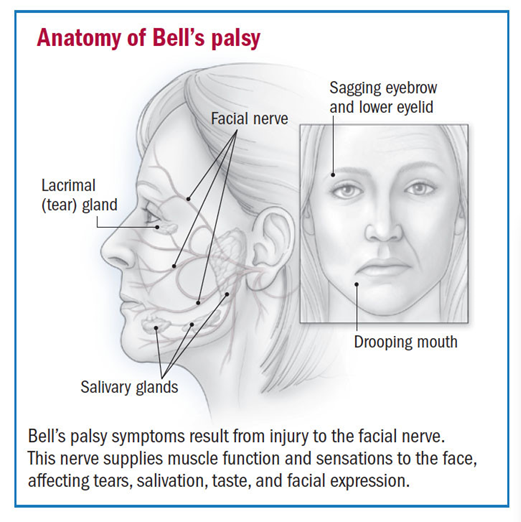There are many medical conditions that can occur throughout our lifetime. Some of these conditions can be temporary, some of them can alter our lives forever. Regardless of the cause and duration, there is almost always a treatment plan to help you with recovery.
In today’s article, we will discuss the condition known as Bell’s Palsy: what it is and how it can be treated. As well as how CBD can help with treatment.
We always recommend speaking to a health care specialist if you are experiencing any unusual symptoms that are affecting your day-to-day life.
What exactly is Bell’s Palsy?

The cause of Bell’s palsy is uncertain, and it can occur at any age. Some of the risk factors include diabetes, a recent upper respiratory tract infection, and pregnancy. Although the exact reason Bell’s palsy occurs isn’t clear, it’s often related to having a viral infection. Viruses that have been linked to Bell’s palsy include viruses that cause: Cold sores and genital herpes (herpes simplex), Chickenpox and shingles (herpes zoster), Infectious mononucleosis (Epstein- Barr), Cytomegalovirus infections, Respiratory illnesses (adenovirus), German measles (rubella), Mumps (mumps virus), Flu (influenza B), & Hand-foot-and-mouth disease (coxsackievirus).
Corticosteroids, a steroid hormone medication, have been found to improve outcomes, while antiviral medications may be of a small additional benefit. The eye should be protected from drying up with the use of eye drops or an eyepatch.
What is CBD & how can it help?
CBD comes from the cannabis or hemp plant; this plant being most commonly known for producing THC. The difference is that with how CBD is extracted from the plant, with that it doesn’t have the part of the plant that can cause a psychoactive effect like THC. CBD as a compound is used for medicinal purposes, generally used for insomnia, pain, inflammation, anxiety, depression, stress, etc. It is legal in most states in the USA (most states require it to be used medicinally), which helps make sure it’s accessible to most people.
CBD can help this condition in a few ways. Although this is not a cure, it can help with a few symptoms that can occur due to this condition. There have been many studies done to demonstrate how CBD can help with numerous ailments, though testing has not been conducted specifically for Bell’s Palsy. Regardless, we will still examine how it can potentially alleviate your symptoms and help with recovery.
Let’s start with it being a neuroprotective antioxidant: CBD has neuroprotective antioxidant properties to reduce free radical damage such as stress and other toxins affecting nerve cell damage. Another thing that CBD is well known for is being an anti-inflammatory: When the facial nerve is compressed and swollen, the symptoms of Bell’s palsy may develop. With CBD having anti-inflammatory properties, it can also help to treat degenerative conditions. People suffering from Bell’s palsy often also suffer from headaches. Coming back to how CBD is used as an anti-inflammatory, CBD for Bell’s treatment has shown optimistic results for different types of headaches. It may not eliminate headaches completely, but there is a considerable reduction in the severity of the headache. CBD is also known for being helpful at reducing pain in the body. People suffering from Bell’s palsy also complain about facial and jaw pain related to the disease. So, CBD can be very useful in reducing that pain through a tincture or a topical product.
In many cases, Bell’s palsy does not need treatment as the symptoms clear up right away. But in a study done on 83 adults, 23 different medications were used to treat the symptoms. Out of all the medications, CBD has showed the most promise and brought the most relief.
Regardless of how you would like to go about your treatment, please consult a health care or CBD specialist to make sure that the treatment you choose is right for you.





Leave A Comment
You must be logged in to post a comment.